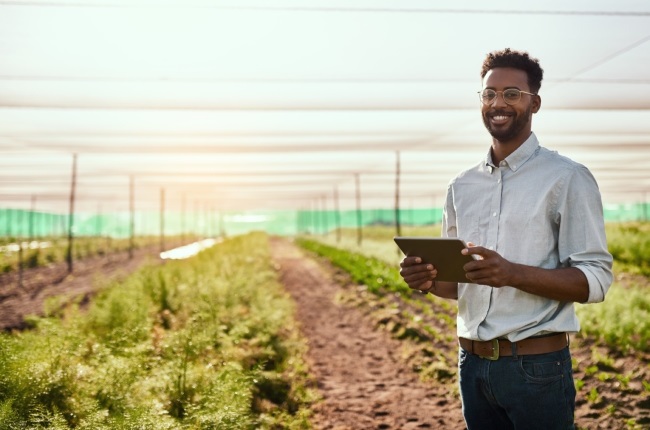
When we’re young, we’re told to diversify our investments and choose an aggressive approach which might yield the highest of ROIs in the long term.
But that’s only half the story. Investing is basically about building up assets. The what is as important as the why, though, explain Ayanda Majola, co-founder and CEO of SV Capital, and Ntuthuko Shezi, CEO of Livestock Wealth.
“I grew up in a rural area and my grandparents owned a couple of cows. The cows were the bedrock of my family’s finances,” Ntuthuko has previously said.
“That got me thinking: cattle are like a walking bank. And we see ourselves (Livestock Wealth) as the bank of the future, where every person who owns a cow can access financial services through Livestock Wealth, just like it has always been in Africa.”
The finance experts explain how you can also start a farming investment.
- CROWDFARMING
Cattle have powerful cultural significance in South Africa and have long been a symbol of wealth. Many people are interested in buying bovine to beef up their returns. Livestock Wealth allows multiple investors to pool their funds via the internet to invest in livestock and grow crops on a working farm. Pooling funds in this type of venture is known as “crowdfarming”, which plays on the concept of “crowdfunding”, explains Shafeeka Anthony of personal finance site JustMoney.co.za. “In this instance, investors can enjoy ownership benefits with some additional advantages. For example, cattle are insured by the farmer, making this a relatively low-risk investment.
“You can start by investing R11,529* in a free-range ox, which delivers a guaranteed return of around R12,105 over six months, based on a minimum profit of R576, or 5%, depending on the weight of the ox and the price of beef. The farmer will buy back the asset once it’s fully grown, and you have the option of collecting your earnings or reinvesting your money. “The platform charges a R49 withdrawal fee when you cash in your profits, but all other costs are factored into the asset purchase.”
Read more | This mom supplies veggies to McCain’s, Boxer, OK Foods, Choppies and more. Here’s how Kokie did it
- FRACTIONAL OWNERSHIP OF A HERD
SV Capital, a company that specialises in asset-backed investments, allows you to contribute to a collective herd of cattle managed on partner Beefcor’s feedlot, according to Shafeeka. “This fractional ownership means any risk is spread among investors, and insurance further mitigates the risk.
“The cattle are in the feedlot for around 120 days.”
“Your return on investment (ROI) is determined by the weight of the cattle and the market price at the time of sale,” explains Ayanda Majola, co-founder and CEO of SV Capital.
The minimum investment is R500, and you can expect an average return of around 14.5% after 12 months, inclusive of fees and costs, when the investment matures. SV Capital charges an upfront fee of 3.8%*, excluding VAT, on funds raised.
“This investment helps you to blend the overall return of your financial portfolio,” says Ayanda. “In addition, it’s a type of impact investment as it creates sustainable jobs.”
- OTHER FARMING INVESTMENTS
“Livestock Wealth has taken the crowdfarming concept a step further with its farmland investment option,” explains Shafeeka. “The platform enables you to invest in a portion of an existing farm, which is then leased out. An investment of R50 000 over eight to 10 years can deliver rental returns at a minimum of 4% a year – possibly suitable for a stokvel that wants to invest in land ownership.”
“This aspirational investment is ideal for a diligent saver who would like to leave a legacy for family members, as assets can be bequeathed,” says Ntuthuko. For investors with less to spend, there’s the option of buying a macadamia tree for R2 000, for a six-year investment period. The farm benefits from the cash flow, to cover operational expenses, and you double your money when the farmer buys back the fully grown tree at the end of the investment period.
Read more | From banker to owner of 3 farms, Limpopo-born Thando Magane, now a Durbanite, has grit and then some
Livestock Wealth and SV Capital – both registered financial services providers – allow you to invest via an app or on their websites.
“Investing in agriculture, such as cattle ownership, has long been an attractive prospect,” adds Shafeeka. “Agriculture offers a tangible and historically resilient asset class that can provide a hedge against economic volatility. The investor can diversify their portfolio, potentially generate income, and contribute to sustainable food production.
“Crowdfarming lowers the barrier of entry to this market, but as with all investments, there is no one-size-fits-all approach.
“Before making any investment decision, seek advice from your bank manager or a reputable financial adviser,” she concludes.
“You need to do your homework properly, if you want to find a cash cow.”
*Investment prices and returns correct at date of issue of original statement.



















